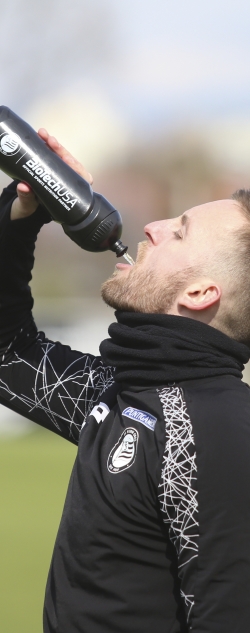
Footballers’ diet – what to eat before a match

A footballer’s diet should be planned very much like an endurance athlete’s, since it’s also a sport that requires a lot of energy. It mostly a duty for the preparatory period to find out by experimenting what amounts, foods, ratios and timing we need to achieve our best shape.
Alternating slow and fast paced movements depletes muscle glycogen stores (energy stores) like running a marathon. For example, a six-second-long full sprint can reduce glycogen stores by up to 15%, whereas a 30-second-long intensive run by up to 30%. According to studies, top footballers may spend up to two-thirds of a match at 85% of the maximum pulse rates, which leads to a total depletion of glycogen stores. And that, by the end of the match, greatly reduces strength and speed.
 What to choose before a match or training
What to choose before a match or training
Muesli (in fact, cereals) and some sweet pastry with milk are a very common breakfast; however, these processed and sugared foods very quickly raise blood sugar levels, which, then, drop just as quickly. That’s when we are surprised to find that we feel too weak to work out or can’t concentrate on our work. As for the unnecessary sugar, our body stores it in fat reserves, and an extra 1 or 2 kilos can already be tiring for an athlete.
About 2 hours before a match, football players need to take in about 600 calories’ worth of food, which more or less equals to three bananas and four slices of wholemeal bread (together).
In order to replenish carbohydrate stores, on the days before the match 2-4 high-carb meals should be inserted in addition to the three usual meals.
Also, on the days before the match, exhausting training sessions should be avoided, in order to prevent glycogen stores from being completely depleted. During a match, 4-5 grams of carbohydrate per body weight kilogram should be taken in.
Carbohydrates of medium/low glycemic index (GI) are: wholemeal cereal products, Basmati rice, millet, bulgur, brown rice, etc.
When to schedule the last meal before a match or training
It’s wise to schedule the last meal before a match or training 2-4 hours before the physical activity, because that will allow enough time for the stomach to empty and for blood sugar and insulin levels to normalise. Also, a full stomach raises the diaphragm, which obstructs breathing, and don’t forget that digestion during a competition or training session makes your body focus its energies on breaking down nutrients, which leads to tiredness. The exact duration depends of the type of food and its natural digestion time, as well as the athlete’s metabolism.
Easy digestibility is a crucial aspect, so for protein sources poultry, eggs and maybe fish are recommended. 30-45 minutes before physical activity, carbohydrates of medium or high glycemic index, that is, fast-absorbing carbohydrates (such as banana, grapes, fruit juice, oat biscuits) are also recommended. This is meant to provide your body enough energy and delay tiredness.
Fluid intake during a match
It’s not only carbohydrates you should pay attention to – fluid intake is at least just as important. During a match, football players may lose up to 2-5 litres of fluid by sweating.
Insufficient fluid intake can lead to an increased pulse rate and body temperature, which can greatly affect performance. To prevent dehydration, drinking Multi Hypotonic Drink during a match or training session is a great solution. Multi Hypotonic Drink also ensures some carbohydrates and minerals to refill the amount lost by sweating.
+ Tip: What to have after a match
The most important thing is rehydration, and then taking in at least 500 calories within 2 hours after the match to replenish the lost carbohydrates.
BioTechUSA